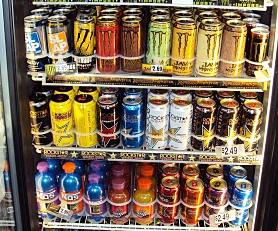Supermarkets, gas station quick marts, even vending machines now offer a variety of energy drinks. Adults, teens, even children are now drinking them on a regular basis.
Athletes are scooping them up to get that extra boost thinking it will help them do better in sports.
Adults are drinking them hoping to be more alert during meetings or just to get through a day following a poor night’s sleep. Children are drinking them to be cool!
Just because something is popular, doesn’t make it good for you. There is controversy over the safety and suitability of energy drinks, especially when used daily.
According to Dr. Lori Bestervelt, NSF International Senior Vice President & Chief Technical Officer, there is limited scientific evidence available that the consumption of energy drinks can significantly improve physical and mental performance.
Dr. Bestervelt states,”Energy drinks should not be confused with sports drinks, such as Gatorade or Powerade that are intended to re-hydrate the body. Sports drinks provide sugars, which the body burns to create energy and replenish electrolytes, helping to maintain salt and potassium balances in the body.
Energy drinks are formulated to deliver high concentrations of caffeine and other stimulants to give the drinker a rush of energy. Athletes use energy drinks to keep up their energy during intense physical activity and for an added edge during competition.
To provide a comparison, 8 ounces of coffee has about 108 milligrams of caffeine, brewed tea has 50 milligrams and 12 ounces of coke has 34 milligrams. Eight ounces of Red Bull, which is part of our certified for sport program, has 75 milligrams of caffeine. However, very highly caffeinated energy drinks have between 150-500 milligrams in 8 ounces.”
Dr. Bestervelt cautions that consuming caffeine at these rates can lead to caffeine intoxication, and, at these high levels caffeine is a stimulant drug. For athletes, rather than re-hydrating their bodies, energy drinks may actually lead to dehydration. They are not formulated or designed to replace lost fluids during exercise.
Because of energy drinks’ high levels of caffeine and other stimulant ingredients, such as, green tea, yerba mate, yohimbine, bitter orange (synephrine or octopamine),vinpocetine, 5- hydroxyl trypophan, methylphenylethylamine (5-HTP) and ginseng, either alone or in combination, athletes could be putting their health at risk by consuming them.
To make matters worse, when these stimulants are used in combination with each other and mixed into one beverage they can also be associated with serious cardiovascular issues.
The bottom line is not enough is known yet about the combination of ingredients in energy drinks and their effects.
Source:
NSF International, a testing and certification organization committed to improving and protecting public health - www.nsf.org


